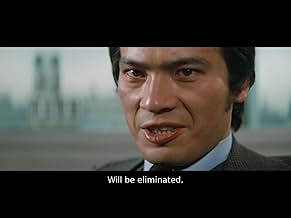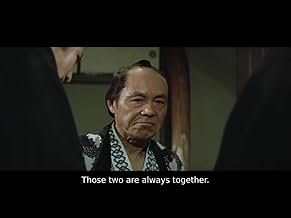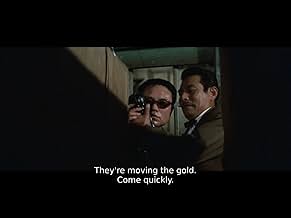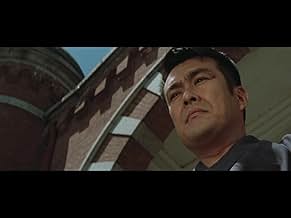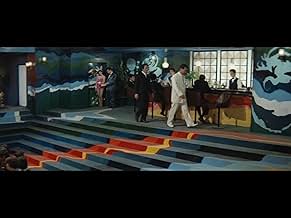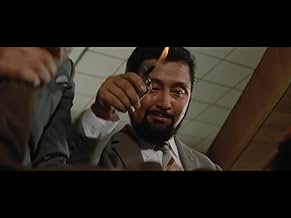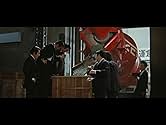IMDb RATING
6.1/10
427
YOUR RATING
A story of yakuza lynching during the Edo, Taisho, and Showa periods.A story of yakuza lynching during the Edo, Taisho, and Showa periods.A story of yakuza lynching during the Edo, Taisho, and Showa periods.
- Director
- Writers
- All cast & crew
- Production, box office & more at IMDbPro
Storyline
Did you know
- ConnectionsReferenced in Erotic-Grotesque and Genre Hopping: Teruo Ishii Speaks (2019)
Featured review
Whatever other labels one may append to this feature, "exploitation" may be the most fitting of all as we're greeted even over the opening credits with scenes of the extreme violence to come. In a title telling three stories across three time periods, that violence is more of a unifying factor than the overarching notion of strict rules among yakuza, and the way that lives are governed and destroyed by those rules. Mind you, even with that tenor in mind, this is quite well made, meeting the production standards of its contemporaries - production standards which, truthfully, tend to be more vibrant than their modern equivalent. It won't appeal to all, and it's definitely flawed in the first place, but for those who are open to what 'Yakuza law' has to offer, it's good enough to warrant checking out if one has the chance.
Fast-paced and fairly chaotic as the picture is, Ishii Teruo's direction is more firm and focused than his writing. Vivid stunts, effects, and action sequences (including that major blood and gore), invariably intense and spirited performances, Furuya Osamu's lush, dynamic cinematography, and indeed the orchestration of shots and scenes can all be broadly credited to that direction. Ishii is also responsible, in turn, for the narrative looseness of the first segment, set during the Edo period, in which a boss' rigid adherence to rules effectively leads to the implosion of an entire organization. The second segment, set following the Meiji restoration, shows that same split in its own way between fine craftsmanship and less polished conception; we're thrown headlong into the plot, and are greeted with an abrupt time skip, in writing that feels somewhat harried. I do think that the screenplay is at least more careful in the second portion, with characters, scene writing, and plot that is more well defined as scheming family members exploit the yakuza code for their own ends. Incredibly, the third segment set in contemporary Japan is even more forthright with its action-oriented crime thriller thrust, and the violence is still more extreme. Now, it rather seems to me that the overarching notion of the yakuza code altogether gets lost in this last third alongside any particular details of the story - though in fairness, the movie at large finds success in the general much more than the specific.
Meanwhile, the flick really is splendidly made in every other capacity. The techniques and technology of the 60s with regards to cinematography, and film and color processing, are frankly tend to be more rich and flavorful, and look better, than what has been developed in all the subsequent years; the flawlessness of modern sensibilities portends sterility, artificiality, and drab imagery. Such considerations only make the beautiful filming locations, exquisite production design and art direction, and fetching costume design, hair, and makeup all the more welcome. 'Yakuza law' even demonstrates a keen mind for mind for lighting, and robust sound design. Yagi Masao's dynamic music, adopting different instrumentation and vibes for each segment, provides adept complement for every scene in turn. Even the editing comes across as being fairly sharp in my opinion.
Across each segment the overall strength varies, and taken as a whole this isn't something that especially demands viewership. It is grimly entertaining, however, just as it is, and smartly made more than not. I wish only that Ishii had devoted more energy to his screenplay, because the most consistent aspect of these ninety-seven minutes - more than even the graphic, often difficult violence - is the weakness of storytelling that struggles to ever impart a cogent, cohesive, coherent narrative. A scattershot sense of "violence among yakuza" only gets us so far, and the violence would be far more meaningful if there were a solid, compelling plot to provide structure. Maybe that's not what Ishii ever intended in the first place, but if so, that doesn't make the result any better. I still think this is duly worthwhile on its own merits, but with that big problem staring down the entire runtime, 'Yakuza law' is perhaps best left for something to fill time on a quiet day.
Fast-paced and fairly chaotic as the picture is, Ishii Teruo's direction is more firm and focused than his writing. Vivid stunts, effects, and action sequences (including that major blood and gore), invariably intense and spirited performances, Furuya Osamu's lush, dynamic cinematography, and indeed the orchestration of shots and scenes can all be broadly credited to that direction. Ishii is also responsible, in turn, for the narrative looseness of the first segment, set during the Edo period, in which a boss' rigid adherence to rules effectively leads to the implosion of an entire organization. The second segment, set following the Meiji restoration, shows that same split in its own way between fine craftsmanship and less polished conception; we're thrown headlong into the plot, and are greeted with an abrupt time skip, in writing that feels somewhat harried. I do think that the screenplay is at least more careful in the second portion, with characters, scene writing, and plot that is more well defined as scheming family members exploit the yakuza code for their own ends. Incredibly, the third segment set in contemporary Japan is even more forthright with its action-oriented crime thriller thrust, and the violence is still more extreme. Now, it rather seems to me that the overarching notion of the yakuza code altogether gets lost in this last third alongside any particular details of the story - though in fairness, the movie at large finds success in the general much more than the specific.
Meanwhile, the flick really is splendidly made in every other capacity. The techniques and technology of the 60s with regards to cinematography, and film and color processing, are frankly tend to be more rich and flavorful, and look better, than what has been developed in all the subsequent years; the flawlessness of modern sensibilities portends sterility, artificiality, and drab imagery. Such considerations only make the beautiful filming locations, exquisite production design and art direction, and fetching costume design, hair, and makeup all the more welcome. 'Yakuza law' even demonstrates a keen mind for mind for lighting, and robust sound design. Yagi Masao's dynamic music, adopting different instrumentation and vibes for each segment, provides adept complement for every scene in turn. Even the editing comes across as being fairly sharp in my opinion.
Across each segment the overall strength varies, and taken as a whole this isn't something that especially demands viewership. It is grimly entertaining, however, just as it is, and smartly made more than not. I wish only that Ishii had devoted more energy to his screenplay, because the most consistent aspect of these ninety-seven minutes - more than even the graphic, often difficult violence - is the weakness of storytelling that struggles to ever impart a cogent, cohesive, coherent narrative. A scattershot sense of "violence among yakuza" only gets us so far, and the violence would be far more meaningful if there were a solid, compelling plot to provide structure. Maybe that's not what Ishii ever intended in the first place, but if so, that doesn't make the result any better. I still think this is duly worthwhile on its own merits, but with that big problem staring down the entire runtime, 'Yakuza law' is perhaps best left for something to fill time on a quiet day.
- I_Ailurophile
- Sep 15, 2024
- Permalink
Details
- Release date
- Country of origin
- Language
- Also known as
- Yakuza's Law: Lynching
- Production company
- See more company credits at IMDbPro
Contribute to this page
Suggest an edit or add missing content


